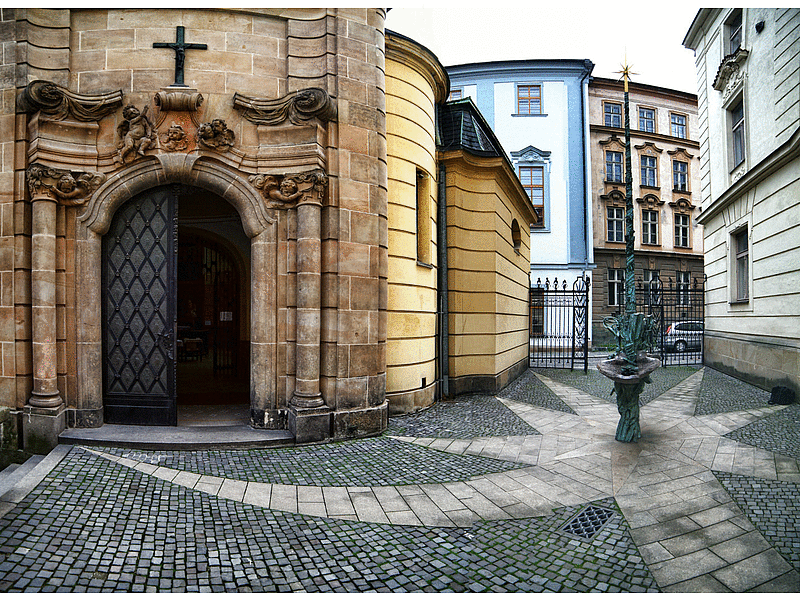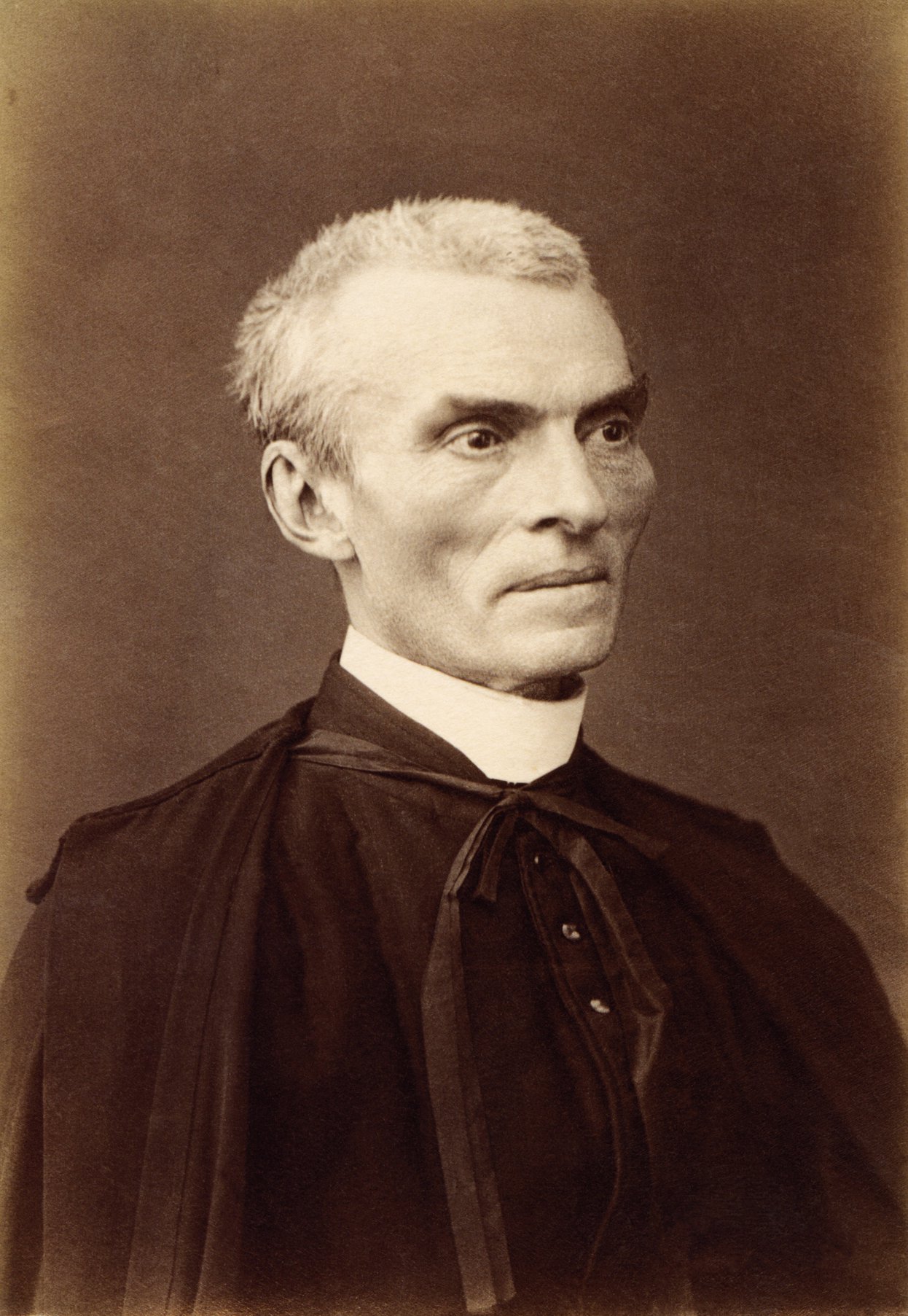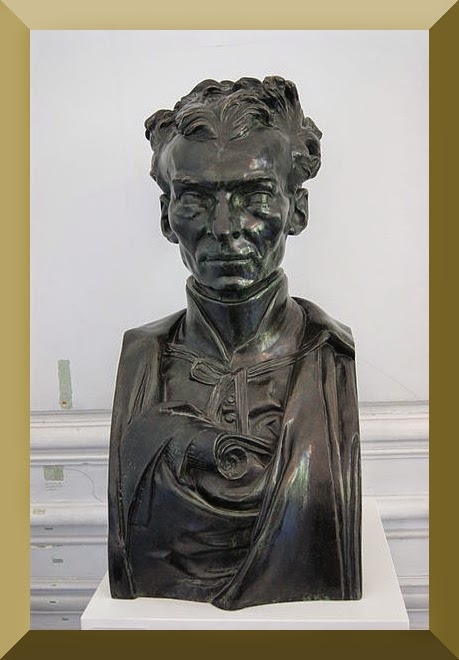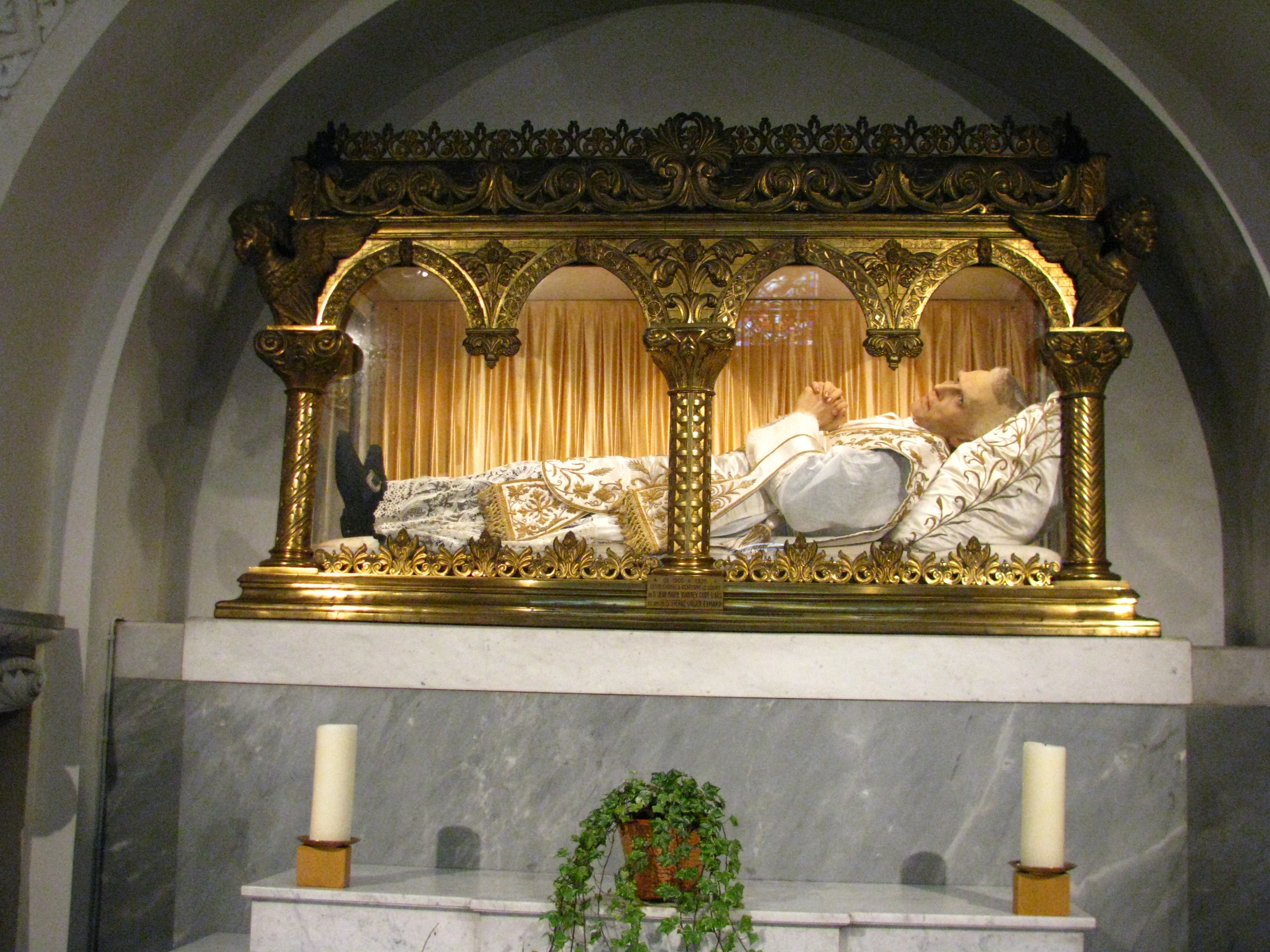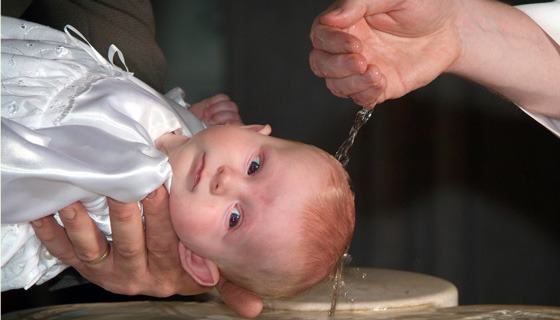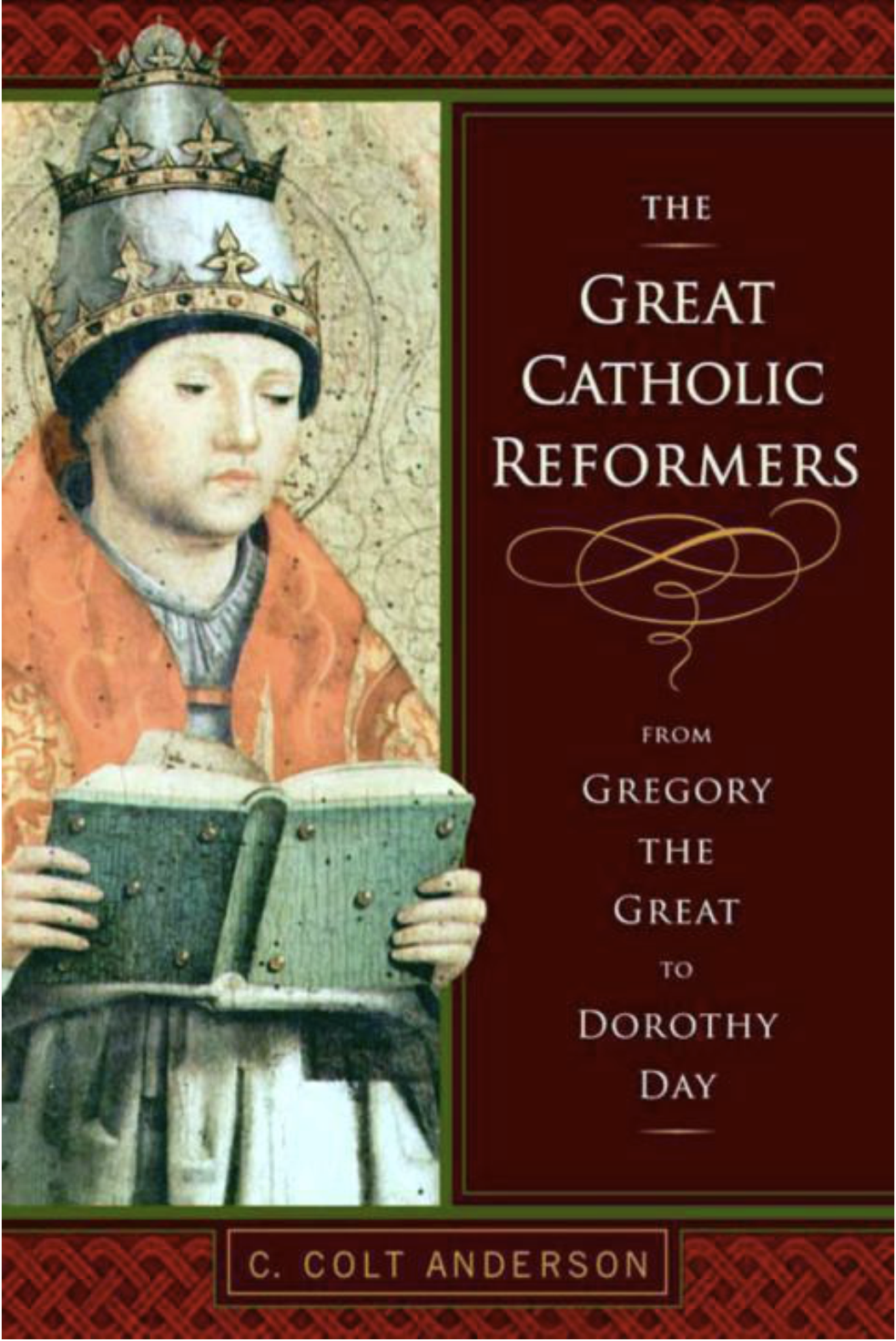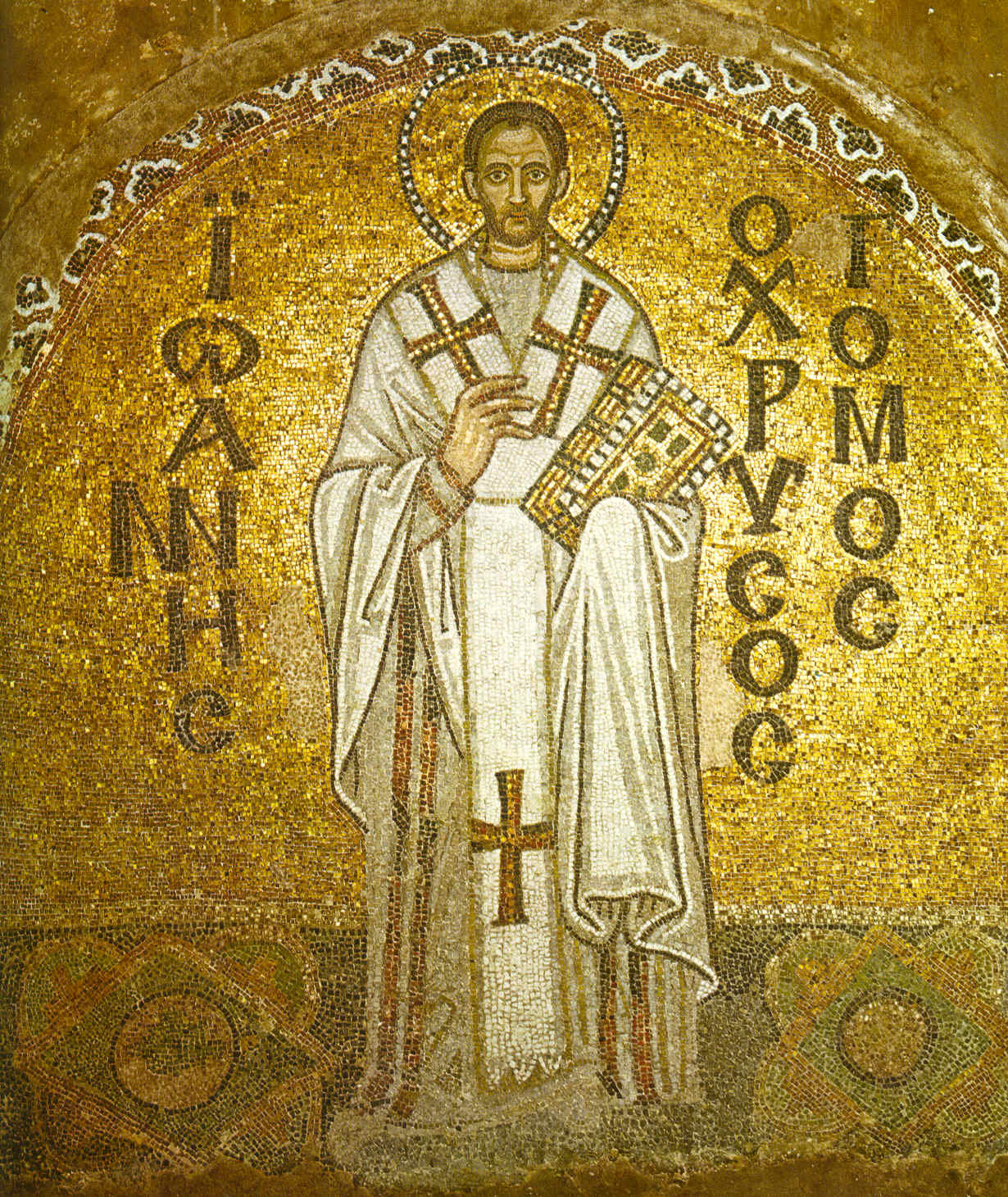
-please click on the image for greater detail
Quick! Name your favorite top ten living great Catholic preachers! Five? One? I trust I make my point. St John Chrysostom was one. Called “Golden-mouthed=Chrysostom”.
For the unlettered and the lettered, one can always recognize holy persons in artwork by universally known symbols in the artwork associated with that personage – iconography. For instance, the artist may have no or there is no universally accepted knowledge of what a person looked like and even among artists across time and distance you will not get a consistent image of the likeness. But, a symbol, such as a honey bee, clearly indicates honey. Right? And when you see a honey bee associated with the image of a man in Catholic art you know they were most likely not canonized for their holy bee keeping skills, but rather the “sweetness of their preaching”, which St Gregory the Great would admonish us is the only proper way of winning hearts and minds for the Lord. One of St John Chrysostom’s identifiable symbols is being depicted in art with honey bees, such was the “sweetness of his preaching”.
The legion of saints of the Church is comprised of people of extraordinary ability whose talents may have been dissimilar but many of whom seem to have shared a common genius for oratory. Yet out of this vast assembly of eloquent speakers, whose reputation might have rested on their gift of expression alone, the one for whom the title “Chrysostom”, or “golden-mouthed” was reserved, was John of Antioch, known as St. John Chrysostom, a great distinction in view of the qualifications of so many others.
Endeared as one of the great doctors of the Church, St. John Chrysostom was born in 347 in Antioch, Syria and was prepared for a career in law under the renowned Libanius, who marveled at his pupil’s eloquence and foresaw a brilliant career for his pupil as statesman and lawgiver. But John decided, after he had been baptised at the age of 23, to abandon the law in favour of service to the Savior. He entered a monastery which served to educate him in preparation for his ordination as a priest in 386 AD. From the pulpit there emerged John, a preacher whose oratorical excellence gained him a reputation throughout the Christian world, a recognition which spurred him to even greater expression that found favour with everyone but the Empress Eudoxia, whom he saw fit to examine in some of his sermons.
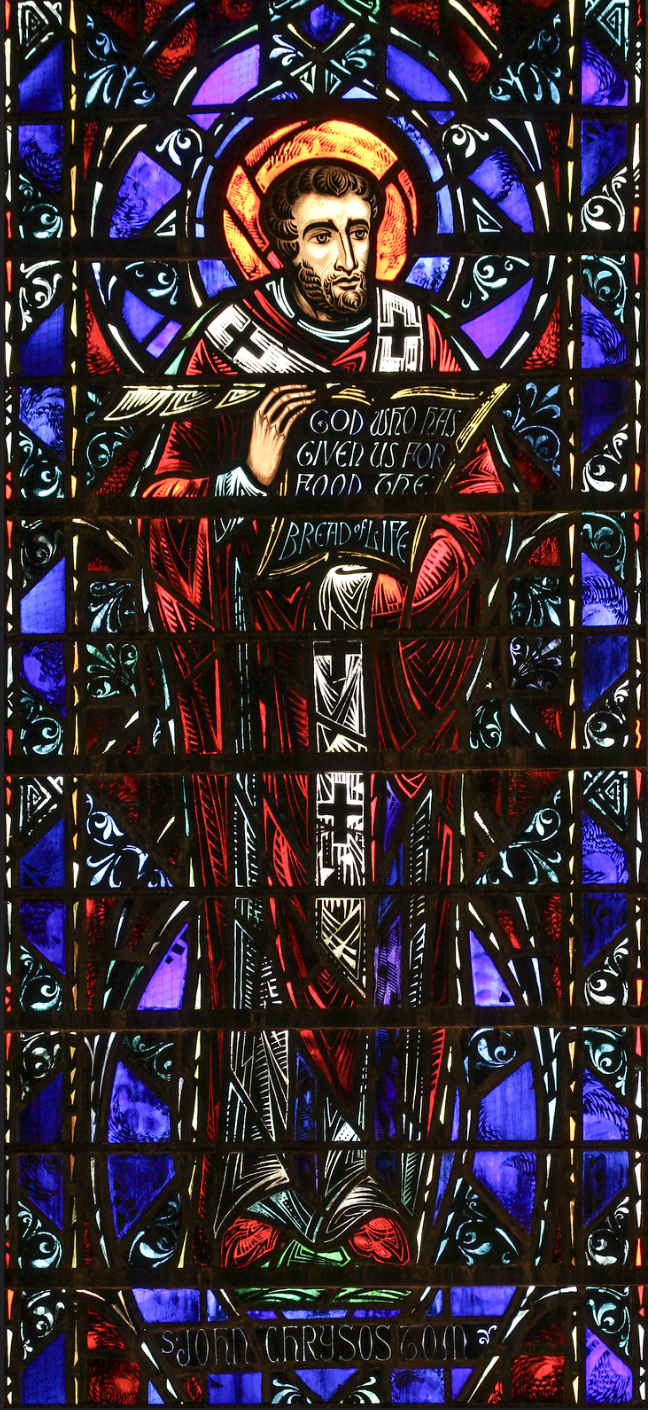
-St John Chrysostom, St Vincent Ferrer Church, NYC
When St. John was forty-nine years old, his immense popularity earned him election to the Patriarchate of Constantinople, a prestigious post from which he launched a crusade against excessiveness and extreme wealth which the Empress construed as a personal affront to her and her royal court. This also gave rise to sinister forces that envied his tremendous influence. His enemies found an instrument for his indictment when they discovered that he had harbored some pious monks who had been excommunicated by his archrival Theophilos, Bishop of Alexandria, who falsely accused John of treason and surreptitiously plotted his exile.
When it was discovered that the great St. John had been exiled by the puppets of the state, there arose such a clamour of protest, promising a real threat of civil disobedience, that not even the royal court dared to confront the angry multitudes and St John was restored to his post. At about this time he put a stop to a practice which was offensive to him, although none of his predecessors outwardly considered it disrespectful; this practice was applauding in church the absence of which some feel adds to the solemnity of Church services.
St. John delivered a sermon in which he deplored the adulation of a frenzied crowd at the unveiling of a public statue of the Empress Eudoxia. His sermon was grossly exaggerated by his enemies, and by the time it reached the ears of the Empress it resulted in his permanent exile from his beloved city of Constantinople. The humiliation of banishment did not deter the gallant, golden-mouthed St. John, who continued to communicate with the Church and wrote his precious prose until he died in the lonely reaches of Pontus on September 14, 407.
The slight, five-foot St. John stood tall in his defiance of state authority, bowing only to God and never yielding the high principles of Christianity to expediency or personal welfare. In the words of his pupil, Cassia of Marseilles, “It would be a great thing to attain his stature, but it would be difficult. Nevertheless, a following of him is lovely and magnificent.”
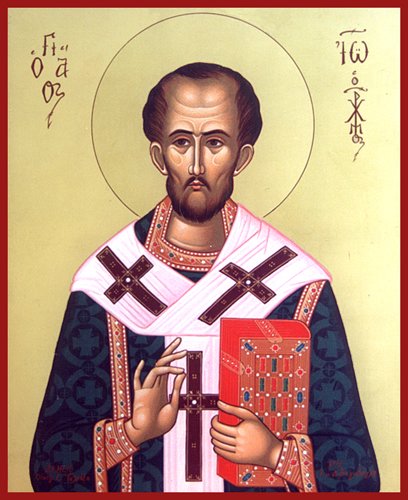
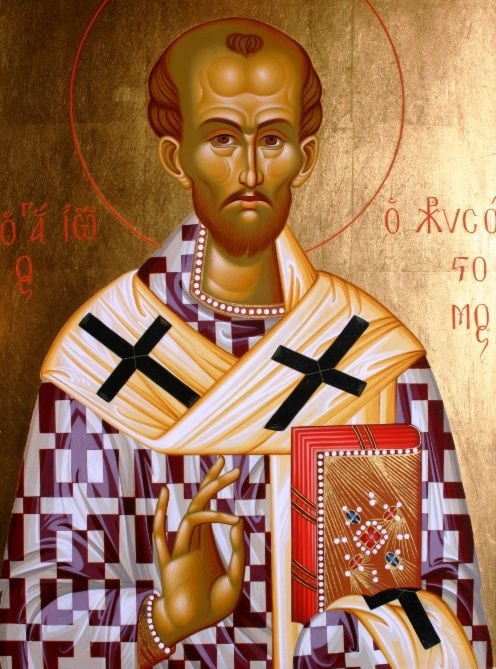
“When you perceive that God is chastening you, fly not to his enemies…but to his friends, the martyrs, the saints, those who were pleasing to Him, and who have great power in God.” – Saint John Chrysostom, Orations, 396.
“When you are before the altar where Christ reposes, you ought no longer to think that you are amongst men; but believe that there are troops of angels and archangels standing by you, and trembling with respect before the sovereign Master of Heaven and earth. Therefore, when you are in church, be there in silence, fear, and veneration.” – Saint John Chrysostom
“If the Lord should give you power to raise the dead, He would give much less than He does when he bestows suffering. By miracles you would make yourself debtor to Him, while by suffering He may become debtor to you. And even if sufferings had no other reward than being able to bear something for that God who loves you, is not this a great reward and a sufficient remuneration? Whoever loves, understands what I say.” – Saint John Chrysostom
“It is clear through unlearned men that the cross was persuasive; in fact, it persuaded the whole world. Paul had this in mind when he said, “The weakness of God is stronger than men.” That the preaching of these men was indeed divine is brought home to us in the same way. For how otherwise could twelve uneducated men, who lived on lakes and rivers and wastelands, get the idea for such an immense enterprise? How could men who perhaps had never been in a city or public square think of setting out to do battle with the whole world? That they were fearful, timid men, the evangelist makes clear; he did not reject the fact or try to hide their weaknesses. Indeed he turned these into a proof of the truth. What did he say of them? That when Christ was arrested, the others fled, despite all the miracles they had seen, while he who was leader of the others denied him! How then account for the fact that these men, who in Christ’s lifetime did not stand up to the attacks by the Jews, set forth to do battle with the whole world once Christ was dead – if, as you claim, Christ did not rise and speak to them and rouse their courage? It is evident, then, that if they had not seen him risen and had proof of his power, they would not have risked so much.” – from a homily by Saint John Chrysostom on the first letter to the Corinthians.
“O envious one, you injure yourself more than he whom you would injure, and the sword with which you wound will recoil and wound yourself. What harm did Cain do to Abel? Contrary to his intention he did him the greatest good, for he caused him to pass to a better and a blessed life, and he himself was plunged into an abyss of woe. In what did Esau injure Jacob? Did not his envy prevent him from being enriched in the place in which he lived; and, losing the inheritance and the blessing of his father, did he not die a miserable death? What harm did the brothers of Joseph do to Joseph, whose envy went so far as to wish to shed his blood? Were they not driven to the last extremity, and well-nigh perishing with hunger, whilst their brother reigned all through Egypt? It is ever thus; the more you envy your brother, the greater good you confer upon him. God, who sees all, takes the cause of the innocent in hand, and, irritated by the injury you inflict, deigns to raise up him whom you wish to lower, and will punish you to the full extent of your crime. If God usually punishes those who rejoice at the misfortunes of their enemies, how much more will He punish those who, excited by envy, seek to do an injury to those who have never injured them?” – Saint John Chrysostom.
“To commit a murder, besides the not having the person in your power, there are many measures and precautions to take. A favorable opportunity must be waited for, and a place must be selected before we can put so damnable a design into execution. More than this, the pistols may miss fire, blows may not be sufficient, and all wounds are not mortal. But to deprive a man of his reputation and honor, one word is sufficient. By finding out the most sensitive part of his honor, you may tarnish his reputation by telling it to all who know him, and easily take away his character for honor and integrity. To do this, however, no time is required, for scarcely have you complacently cherished the wish to calumniate him, than the sin is effected.” – Saint John Chrysostom
“There is nothing to be dreaded in human ills except sin—not poverty, or disease, or insult, or ill treatment, or dishonor, or death, which people call the worst of evils. To those who love spiritual wisdom, these things are only the names of disasters, names that have no substance. No, the true disaster is to offend God, to do anything that displeases him.”
— St. John Chrysostom, p. 334, A Year with the Church Fathers
“I beseech you, my brothers, to be ever on your guard against the habit of swearing and blaspheming. If a slave dare to pronounce the name of his master, he does it but seldom, and then only with respect; therefore is it not a shocking impiety to speak with contempt and irreverence of the name of the Master of angels and seraphim? People handle the book of the Gospel with a religious fear, and then only with clean hands, and yet your rash tongue would inconsiderately profane the name of the Divine Author of the Gospel. Would you wish to know with what respect, fear, and wonder the choirs of the angels pronounce the adorable name? Listen to the prophet Isaiah: ” I saw,” says Isaiah, “the Lord sitting upon a throne high and elevated; upon it stood the seraphim, who cried one to another and said, Holy, holy, holy, the Lord God of hosts, all the earth is full of His glory.” See with what terror they are seized, even while they praise and glorify Him. As for you, my brethren, you know how cold and indifferent are the prayers you say, and you know how frequently you blaspheme a name so majestic, so sacred, and how you try to make excuses for the bad habit you have contracted. It is easy, yes, I say, it is easy, with a little care, attention, and reflection, to leave off this vicious habit. Since we have fallen, my brethren, into this sin of blasphemy, I conjure you, in the name of our Lord, to rebuke openly these blasphemers. When you meet with such who publicly sin in this respect, correct them by word of mouth, and, if necessary, by your strong arm. Let these shameless swearers be covered with confusion. You could not employ your hand to a holier work. And if you are given into custody, go boldly before the magistrate, and say in your defense that you have avenged a blasphemy. For if a person is punished for speaking contemptuously of a prince, is it not reasonable to suppose that a person who speaks irreverently of God should be sentenced to a severer punishment? It is a public crime, a common injury which all the world ought to condemn. Let the Jews and infidels see that our magistrates are Christians, and that they will not allow those to go unpunished who insult and outrage their Master. Do you remember that it was a false oath that overturned the houses, temples, and walls of Jerusalem, and from a superb city it became a mass of ruins? Neither the sacred vessels nor the sanctuary could stay the vengeance of a God justly angered against a violater of His word. Sedecias did not receive a more favored treatment than Jerusalem. Flight did not save him from his enemies. This prince, escaping secretly, was pursued and taken by the Assyrians, who led him to their king. The king, after asking him the reason of his perfidy, not only caused his children to be killed, but deprived him of his sight, and sent him back to Babylon, loaded with iron chains. Would you know the reason why? It was that the barbarians and Jews who inhabited the country adjoining Persia should know, by this terrible example, that the breach of an oath is punishable.” – Saint John Chrysostom, from the Seventh Homily.
“If any man be devout and love God, let him enjoy this fair and radiant triumphal feast. If any man be a wise servant, let him rejoicing enter into the joy of his Lord. If any have labored long in fasting, let him now receive his recompense. If any have wrought from the first hour, let him today receive his just reward. If any have come at the third hour, let him with thankfulness keep the feast. If any have arrived at the sixth hour, let him have no misgivings; because he shall in nowise be deprived therefor. If any have delayed until the ninth hour, let him draw near, fearing nothing. If any have tarried even until the eleventh hour, let him, also, be not alarmed at his tardiness; for the Lord, who is jealous of his honor, will accept the last even as the first; he gives rest unto him who comes at the eleventh hour, even as unto him who has wrought from the first hour.
And he shows mercy upon the last, and cares for the first; and to the one he gives, and upon the other he bestows gifts. And he both accepts the deeds, and welcomes the intention, and honors the acts and praises the offering. Wherefore, enter you all into the joy of your Lord; and receive your reward, both the first, and likewise the second. You rich and poor together, hold high festival. You sober and you heedless, honor the day. Rejoice today, both you who have fasted and you who have disregarded the fast. The table is full-laden; feast ye all sumptuously. The calf is fatted; let no one go hungry away.
Enjoy ye all the feast of faith: Receive ye all the riches of loving-kindness. Let no one bewail his poverty, for the universal kingdom has been revealed. Let no one weep for his iniquities, for pardon has shown forth from the grave. Let no one fear death, for the Savior’s death has set us free. He that was held prisoner of it has annihilated it. By descending into Hell, He made Hell captive. He embittered it when it tasted of His flesh. And Isaiah, foretelling this, did cry: Hell, said he, was embittered, when it encountered Thee in the lower regions. It was embittered, for it was abolished. It was embittered, for it was mocked. It was embittered, for it was slain. It was embittered, for it was overthrown. It was embittered, for it was fettered in chains. It took a body, and met God face to face. It took earth, and encountered Heaven. It took that which was seen, and fell upon the unseen.
O Death, where is your sting? O Hell, where is your victory? Christ is risen, and you are overthrown. Christ is risen, and the demons are fallen. Christ is risen, and the angels rejoice. Christ is risen, and life reigns. Christ is risen, and not one dead remains in the grave. For Christ, being risen from the dead, is become the first fruits of those who have fallen asleep. To Him be glory and dominion unto ages of ages. Amen.” -The Paschal (Easter) Sermon of St. John Chrysostom
O my all-merciful God and Lord, Jesus Christ, full of pity:
Through Your great love You came down
and became incarnate in order to save everyone.
O Savior, I ask You to save me by Your grace!
If You save anyone because of their works,
that would not be grace but only reward of duty,
but You are compassionate and full of mercy!
You said, O my Christ,
“Whoever believes in Me shall live and never die.”
If then, faith in You saves the lost, then save me,
O my God and Creator, for I believe.
Let faith and not my unworthy works be counted to me, O my God,
for You will find no works which could account me righteous.
O Lord, from now on let me love You as intensely as I have loved sin,
and work for You as hard as I once worked for the evil one.
I promise that I will work to do Your will,
my Lord and God, Jesus Christ, all the days of my life and forever more. -St John Chrysostom

-eucharistic miracle of Santarem, Portugal
“How many of you say:
I should like to see His face,
His garments, His shoes.
You do see Him, you touch Him,
you eat Him. He gives Himself to you,
not only that you may see Him, but also
to be your food and nourishment.”
—St. John Chrysostom
Troparion to St. John (Tone 8)
“Grace like a flame shining forth from thy mouth has illumined the universe, and disclosed to the world treasures of poverty and shown us the height of humility. And as by thine own words thou teachest us, Father John Chrysostom, so intercede with the Word, Christ our God, to save our souls.”
“Prayer is the place of refuge for every worry, a foundation for cheerfulness, a source of constant happiness, a protection against sadness.” -St. John Chrysostom
“The road to Hell is paved with the skulls of erring priests, with bishops as their signposts” – St. John Chrysostom
“All seek joy, but it is not found on earth.” -St. John Chrysostom
“The cross is our trophy raised against the demons, our sword against sin, and the sword of Christ used to pierce the serpent.”
-St. John Chrysostom
“Riches are not forbidden, but the pride of them is.”
-St. John Chrysostom
“If you cannot find Christ in the beggar at the church door, you will not find Him in the chalice.”
—St. John Chrysostom
“A friend is more to be longed for than the light; I speak of a genuine one. And wonder not: for it were better for us that the sun should be extinguished, than that we should be deprived of friends; better to live in darkness, than to be without friends.”
–St. John Chrysostom
“Mercy imitates God and disappoints Satan.” -St. John Chrysostom
“God asks little, but He gives much.” –St. John Chrysostom
“We must not mind insulting men, if by respecting them we offend God.”
-St. John Chrysostom
“There is nothing colder than a Christian who does not seek to save others.”
— St. John Chrysostom
“What the soul is in the body, let Christians be in the world.” -St. John Chrysostom
“And though every day a man lives may rightly be a day of repentance, yet is it in these days more becoming, more appropriate, to confess our sins, to fast, and to give alms to the poor; since in these days you may wash clean the sins of the whole year.” -St. John Chrysostom
“If we approach with faith, we too will see Jesus … for the Eucharistic table takes the place of the crib. Here the Body of the Lord is present, wrapped not in swaddling clothes but in the rays of the Holy Spirit.”
–St. John Chrysostom
“Happiness can only be achieved by looking inward and learning to enjoy whatever life has, and this requires transforming greed into gratitude.”
–St. John Chrysostom
“God loves us more than a father, mother, friend, or any else could love, and even more than we are able to love ourselves.”
-St. John Chrysostom
“If then we have angels, let us be sober, as though we were in the presence of tutors; for there is a demon present also.”
–St. John Chrysostom
“Helping a person in need is good in itself. But the degree of goodness is hugely affected by the attitude with which it is done. If you show resentment because you are helping the person out of a reluctant sense of duty, then the person may receive your help but may feel awkward and embarrassed. This is because he will feel beholden to you. If, on the other hand, you help the person in a spirit of joy, then the help will be received joyfully. The person will feel neither demeaned nor humiliated by your help, but rather will feel glad to have caused you pleasure by receiving your help. And joy is the appropriate attitude with which to help others because acts of generosity are a source of blessing to the giver as well as the receiver.”
–St. John Chrysostom
“Man threw away everything he had—his right to speak freely, his communion with God, his time in Paradise, his unclouded life—and went out naked, like a survivor from a shipwreck. But God received him and immediately clothed him, and taking him by the hand gradually led him to heaven. And yet the shipwreck was quite unforgivable. For this tempest was entirely due, not to the force of the winds, but to the carelessness of the sailor. Yet God did not look at this, but had compassion for such a great disaster. … Why? Because, when no sadness or care or labor or toil or countless waves of desire assaulted our nature, it was overturned and fell. And just as criminals who sail the sea often drill through the ship with a small iron tool, and let the whole sea into the ship from below, so when the devil saw the ship of Adam (by which I mean his soul) filled with many good things, he came and drilled through it with his voice alone, as if it were an iron tool, and stole all his wealth and sank the ship itself. But God made the gain greater than the loss, and brought our nature to the royal throne.”
—St. John Chrysostom
“I behold a new and wondrous mystery. My ears resound to the Shepherd’s song, piping no soft melody, but chanting full forth a heavenly hymn.”
– St. John Chrysostom
“Even if you do not confess, God is not ignorant of the deed, since he knew it before it was committed. Why then do you not speak of it? Does the transgression become heavier by the confession? No, it becomes lighter and less troublesome. And this is why He wants you to confess: not that you should be punished, but that you should be forgiven; not that He may learn your sin—how could that be, since He has seen it?—but that you may learn what favor He bestows. He wishes you to learn the greatness of His grace, so that you may praise Him perfectly, that you may be slower to sin, that you may be quicker to virtue. And if you do not confess the greatness of the need, you will not understand the enormous magnitude of His grace.”
—St. John Chrysostom
“There is nothing to be dreaded in human ills except sin—not poverty, or disease, or insult, or ill treatment, or dishonor, or death, which people call the worst of evils. To those who love spiritual wisdom, these things are only the names of disasters, names that have no substance. No, the true disaster is to offend God, to do anything that displeases Him.”
—St. John Chrysostom
“The Devil didn’t deal out temptations to Our Lord only. He brings these evil schemes of his to bear on each of Jesus’ servants—and not just on the mountain or in the wilderness or when we’re by ourselves. No, he comes after us in the city as well, in the marketplaces, in courts of justice. He tempts us by means of others, even our own relatives. So what must we do? We must disbelieve him altogether, and close our ears against him, and hate his flattery. And when he tries to tempt us further by offering us even more, then we should shun him all the more. . . We aren’t as intent on gaining our own salvation as he is intent on achieving our ruin. So we must shun him, not with words only, but also with works; not in mind only, but also in deed. We must do none of the things that he approves, for in that way will we do all those things that God approves. Yes, for the Devil also makes many promises, not so that he may give them to us, but so that he may take away from us. He promises plunder, so that he may deprive us of the kingdom of God and of righteousness. He sets out treasures in the earth as snares and traps, so that he may deprive us both of these and of the treasures in heaven. He would have us be rich in this life, so that we may not be rich in the next.”
—St. John Chrysostom
“The fast of Lent has no advantage to us unless it brings about our spiritual renewal. It is necessary while fasting to change our whole life and practice virtue. Turning away from all wickedness means keeping our tongue in check, restraining our anger, avoiding all gossip, lying and swearing. To abstain from these things—herein lies the true value of the fast.”
–St. John Chrysostom
“Let us help one another spiritually. Let us hinder those things that lead our friends away to hell.”
-St. John Chrysostom
“The love of husband and wife is the force that welds society together.”
-St. John Chrysostom
Prayer to Saint John Chrysostom
Dear Saint John, your oratorical gifts inspired thousands and earned you the name “golden-mouthed.” Continue to inspire Christians through your writings and grant us a rebirth of Christian preaching for the spiritual renewal of the Church. Obtain from God preachers like yourself who, animated by the Holy Spirit, deserve to be called other Christs and forcefully preach the Good News. Amen.
Love,
Matthew



